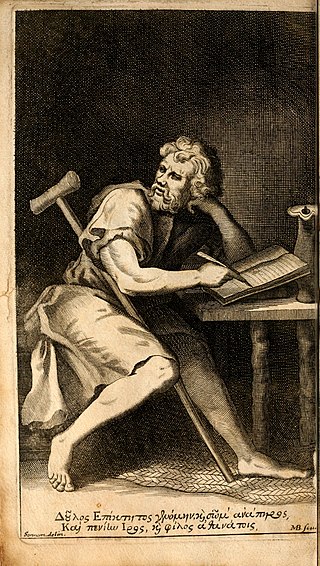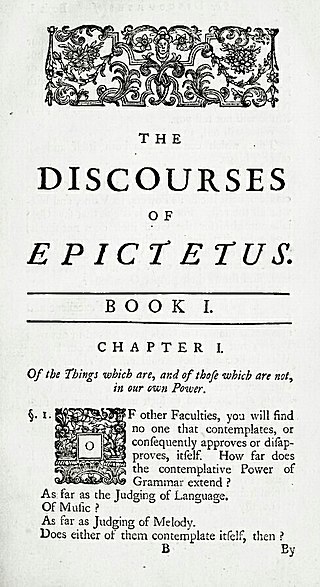Related Research Articles

Epictetus was a Greek Stoic philosopher. He was born into slavery at Hierapolis,Phrygia and lived in Rome until his banishment,when he went to Nicopolis in northwestern Greece,where he spent the rest of his life. His teachings were written down and published by his pupil Arrian in his Discourses and Enchiridion.

Posidonius "of Apameia" or "of Rhodes",was a Greek politician,astronomer,astrologer,geographer,historian,mathematician,and teacher native to Apamea,Syria. He was considered the most learned man of his time and,possibly,of the entire Stoic school. After a period learning Stoic philosophy from Panaetius in Athens,he spent many years in travel and scientific researches in Spain,Africa,Italy,Gaul,Liguria,Sicily and on the eastern shores of the Adriatic. He settled as a teacher at Rhodes where his fame attracted numerous scholars. Next to Panaetius he did most,by writings and personal lectures,to spread Stoicism to the Roman world,and he became well known to many leading men,including Pompey and Cicero.

Pyrrho of Elis,born in Elis,Greece,was a Greek philosopher of Classical antiquity,credited as being the first Greek skeptic philosopher and founder of Pyrrhonism.

Cleanthes,of Assos,was a Greek Stoic philosopher and boxer who was the successor to Zeno of Citium as the second head (scholarch) of the Stoic school in Athens. Originally a boxer,he came to Athens where he took up philosophy,listening to Zeno's lectures. He supported himself by working as a water-carrier at night. After the death of Zeno,c. 262 BC,he became the head of the school,a post he held for the next 32 years. Cleanthes successfully preserved and developed Zeno's doctrines. He originated new ideas in Stoic physics,and developed Stoicism in accordance with the principles of materialism and pantheism. Among the fragments of Cleanthes' writings which have come down to us,the largest is a Hymn to Zeus. His pupil was Chrysippus who became one of the most important Stoic thinkers.

Timon of Phlius was an Ancient Greek philosopher from the Hellenistic period,who was the student of Pyrrho. Unlike Pyrrho,who wrote nothing,Timon wrote satirical philosophical poetry called Silloi (Σίλλοι) as well as a number of prose writings. These have been lost,but the fragments quoted in later authors allow a rough outline of his philosophy to be reconstructed.
Aristo of Chios,also spelled Ariston,was a Greek Stoic philosopher and colleague of Zeno of Citium. He outlined a system of Stoic philosophy that was,in many ways,closer to earlier Cynic philosophy. He rejected the logical and physical sides of philosophy endorsed by Zeno and emphasized ethics. Although agreeing with Zeno that Virtue was the supreme good,he rejected the idea that morally indifferent things such as health and wealth could be ranked according to whether they are naturally preferred. An important philosopher in his day,his views were eventually marginalized by Zeno's successors.
Diodorus Cronus was a Greek philosopher and dialectician connected to the Megarian school. He was most notable for logic innovations,including his master argument formulated in response to Aristotle's discussion of future contingents.
Ancient Roman philosophy is philosophy as it was practiced in the Roman Republic and its successor state,the Roman Empire. Roman philosophy includes not only philosophy written in Latin,but also philosophy written in Greek in the late Republic and Roman Empire. Important early Latin-language writers include Lucretius,Cicero,and Seneca the Younger. Greek was a popular language for writing about philosophy,so much so that the Roman Emperor Marcus Aurelius chose to write his Meditations in Greek.
Arthur Hilary Armstrong,was an English educator and author. Armstrong is recognized as one of the foremost authorities on the philosophical teachings of Plotinus. His multi-volume translation of the philosopher's teachings is regarded as an essential tool of classical studies.
Stoic passions are various forms of emotional suffering in Stoicism,a school of Hellenistic philosophy.
Neostoicism was a philosophical movement that arose in the late 16th century from the works of Justus Lipsius,and sought to combine the beliefs of Stoicism and Christianity. Lipsius was Flemish and a Renaissance humanist. The movement took on the nature of religious syncretism,although modern scholarship does not consider that it resulted in a successful synthesis. The name "neostoicism" is attributed to two Roman Catholic authors,Léontine Zanta and Julien-Eymard d'Angers.
Kathēkon is a Greek concept,forged by the founder of Stoicism,Zeno of Citium. It may be translated as "appropriate behaviour","befitting actions",or "convenient action for nature",or also "proper function". Kathekon was translated in Latin by Cicero as officium,and by Seneca as convenentia. Kathēkonta are contrasted,in Stoic ethics,with katorthōma,roughly "perfect action"
Hellenistic philosophy is Ancient Greek philosophy corresponding to the Hellenistic period in Ancient Greece,from the death of Alexander the Great in 323 BC to the Battle of Actium in 31 BC. The dominant schools of this period were the Stoics,the Epicureans and the Skeptics.

The Discourses of Epictetus are a series of informal lectures by the Stoic philosopher Epictetus written down by his pupil Arrian around 108 AD. Four books out of an original eight are still extant. The philosophy of Epictetus is intensely practical. He directs his students to focus attention on their opinions,anxieties,passions,and desires,so that "they may never fail to get what they desire,nor fall into what they avoid." True education lies in learning to distinguish what is our own from what does not belong to us,and in learning to correctly assent or dissent to external impressions. The purpose of his teaching was to make people free and happy.
Arius Didymus was a Stoic philosopher and teacher of Augustus. Fragments of his handbooks summarizing Stoic and Peripatetic doctrines are preserved by Stobaeus and Eusebius.
David Neil Sedley FBA is a British philosopher and historian of philosophy. He was the seventh Laurence Professor of Ancient Philosophy at Cambridge University.
Pneuma is an ancient Greek word for "breath",and in a religious context for "spirit" or "soul". It has various technical meanings for medical writers and philosophers of classical antiquity,particularly in regard to physiology,and is also used in Greek translations of ruachרוח in the Hebrew Bible,and in the Greek New Testament.

Stoicism is a school of Hellenistic philosophy that flourished in Ancient Greece and Ancient Rome. The Stoics believed that the practice of virtue is enough to achieve eudaimonia:a well-lived life. The Stoics identified the path to achieving it with a life spent practicing the four virtues in everyday life:wisdom,courage,temperance or moderation,justice,and living in accordance with nature. It was founded in the ancient Agora of Athens by Zeno of Citium around 300 BC.
A sage,in classical philosophy,is someone who has attained wisdom. The term has also been used interchangeably with a 'good person',and a 'virtuous person'. Among the earliest accounts of the sage begin with Empedocles' Sphairos. Horace describes the Sphairos as "Completely within itself,well-rounded and spherical,so that nothing extraneous can adhere to it,because of its smooth and polished surface." Alternatively,the sage is one who lives "according to an ideal which transcends the everyday."
Gretchen Reydams-Schils is Professor in the Program of Liberal Studies at the University of Notre Dame,and holds concurrent appointments in Classics,Philosophy,and Theology. She is a specialist in Plato and the traditions of Platonism and Stoicism.
References
- ↑ "Berkeley Classics News – Tony Long retires 29 July 2013". Archived from the original on 22 July 2018. Retrieved 16 June 2014.
- ↑ British Academy Fellowship record Archived March 3, 2016, at the Wayback Machine